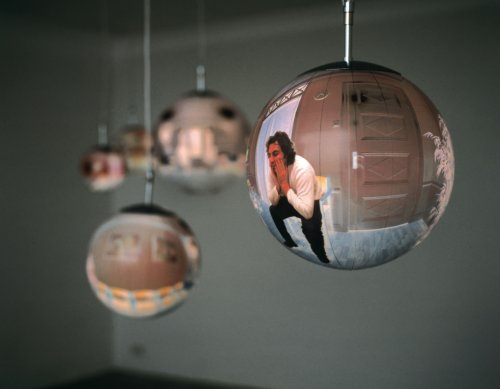What is Important?
dal 10/2/2005 al 17/4/2005
Segnalato da
Knut Asdam
Bigert & Bergstrom
Agnieszka Brzezanska
Aristarkh Chernyshev
Oskar Dawicki
Miklos Gaal
Ilkka Halso
Isabell Heimerdinger
Elsebeth Jørgensen
Anne Szefer Karlsen
Eve Kask
Joachim Koester
Tatyana Liberman
Wiebke Loeper
Wolfgang Ploger
Arturas Raila
Gatis Rozenfelds
Johanna Rylander
Jari Silomaki
Florian Slotawa
Irma Stanaityte
Dorothee Bienert
Lars Grambye
Lolita Jablonskiene
10/2/2005
What is Important?
Malmo Konsthall, Malmo
3rd Ars Baltica Triennial of Photographic Art. It's a forum for the cross-border cultural exchange in the Baltic area. Working with the question and title, the curatorial team aims to deepen the critical dialogue on art and photography between artists, curators and institutions in the region. The artists in this exhibition combine an interest in the apparently unimportant and the desire to evoke important narratives.

3rd Ars Baltica Triennial of Photographic Art
Artists in the exhibition: Knut Åsdam (NO), Bigert & Bergström (SE, Agnieszka Brzezanska (PL),
Aristarkh Chernyshev (RU), Oskar Dawicki (PL), Miklos Gaál (FIN), Ilkka
Halso (FIN), Isabell Heimerdinger (DE), Elsebeth Jørgensen (DK), Anne
Szefer Karlsen (NO), Eve Kask (EE), Joachim Koester (DK), Tatyana Liberman
(RU), Wiebke Loeper (DE), Wolfgang Plöger (DE), Arturas Raila (LT), Gatis
Rozenfelds (LV), Johanna Rylander (SE), Jari Silomäki (FIN), Florian
Slotawa (DE), Irma Stanaityte (LT)
curatorial team: Dorothee Bienert, Berlin; Lars Grambye, Malmö/Copenhagen; Lolita
Jablonskiene, Vilnius
Ars Baltica is a forum for the cross-border cultural exchange in the
Baltic area. Working with the question and title What is Important?, the
curatorial team of the 3rd Ars Baltic Triennial of Photographic Art aims
to deepen the critical dialogue on art and photography between artists,
curators and institutions in the region.
The structural content of the project begins by looking at what is
important today for Baltic artists who use the photographic medium.
Etymologically, “important†is that which is valuable enough to be
“brought inâ€, in other words, that which the individual or a community
searches out and selects for itself.
What is Important? is not a thematic exhibition, but the works chosen do
relate a certain artistic attitude. While many artists were concerned with
establishing photography as art in the 90s, today, art with photography is
one of many artistic strategies. Artists avoid the single representative
image or play with it, include the performative and the narrative in their
work, and produce image kaleidoscopes or complexes. Photography is not
singled out as a specific medium, but is used by the artist, as others use
it. In other words, formal issues are less important than the artist’s
attempt to extract segments of reality, import and appropriate them, and
communicate these to others.
Paradoxically enough, the artists in this exhibition combine an interest
in the apparently unimportant and the desire to evoke important
narratives. The most different forms of narrative in today’s Baltic
photographic art are established around the following points of
crystallisation. On the one hand, there are the stories that deal with the
self, or where the public colliding with the private becomes an issue, and
in which subjective experience and playful narratives replace the focus on
the body typical of the 80s and 90s. On the other hand are the stories in
which locations around and beyond the self are a central issue, and where
the subjective importance of places supersedes the detached viewpoint on
sites, characteristic of the early 90s. Concentrating on the local, the
private, and the personal point of view, the artists attribute particular
importance to individual territories, not yet absorbed globally or
medially.
catalogue
A catalogue with 160 pages and approx. 150 illustrations is available. The
publication in English is conceived as a discussion forum on art and
photography in the Baltic region, and encloses text contributions by the
artists as well as by Dorothee Bienert, Ekaterina Degot, Helena Demakova,
Lukasz Gorczyca, Lars Grambye, Jonas Ekeberg, Anders Härm & Hanno Soans,
Mika Hannula, Lolita Jablonskiene, Lars Bang Larsen, John Peter Nilsson,
Jonas Valatkevicius and Jan Verwoert.
The exhibition has previously been showed in Stadtgalerie Kiel (D); Mecklenburgisches Kuenstlerhaus Schloss Plueschow (D); Bergen Kunsthall, Bergen (N); Contemporary Art Centre, Vilnius; Former Building of the Riga City Council, Riga (LV), Tallinn Art Hall, Tallinn (EE), Pori Art Museum, Pori (FIN)
An exhibition project by the Ministry of Education, Science, Research and
Culture of Schleswig-Holstein in collaboration with the Ars Baltica Berlin
Office
support
Exhibition and catalogue have been funded by the Federal Cultural
Foundation, Germany; as well as the Federal Foreign Office, Berlin; the
Stiftung Kulturfonds, Berlin
and the following institutions in the Ars Baltica partner countries: Arts
Council of Finland, Helsinki; Centre for Contemporary Arts (CCA), Tallinn;
Contemporary Art Information Center (CAIC), Vilnius; Culture Capital
Foundation of Latvia (CCF), Riga; Danish Contemporary Art Foundation
(DCA), Copenhagen; Finnish Fund for Art Exchange (FRAME), Helsinki;
International Artists’ Studio Program in Sweden (IASPIS), Stockholm;
Latvian Centre for Contemporary Art (LCCA), Riga; Moderna Museet,
International Programme, Stockholm; Ministry of Culture of the Republic of
Latvia, Riga; Ministry of Culture of the Republic of Estonia, Tallinn;
Ministry of Culture, International Relations and European Integration
Department, Warsaw; Ministry of Culture of the Republic of Lithuania,
Vilnius; National Centre for Contemporary Arts (NCCA), Moscow; Office for
Contemporary Art Norway, Oslo; Royal Ministry of Foreign Affairs, Oslo
http://www.ars-baltica.net
opening: Friday, February 11th 2005, 7-9 p.m.
press preview: Thursday, February 10th 2005, 11 a.m.
Image: Bigert & Bergström, The Waiting Room, 2002
Malmö Konsthall - S:t Johannesgatan 7 - SE-200 10 Malmö
opening hours: 11 a.m. - 5p.m., Wed 11 a.m. – 9 p.m



